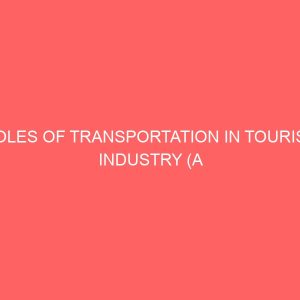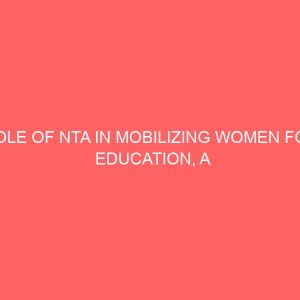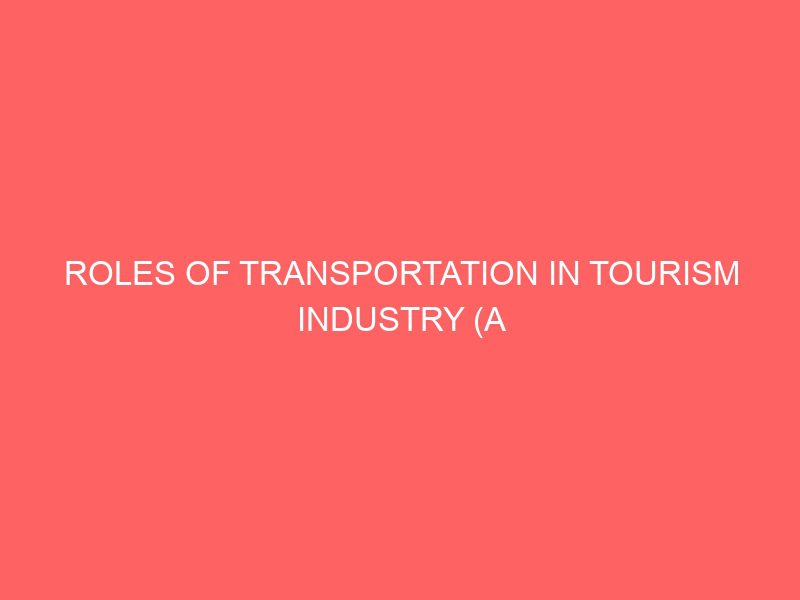Description
ABSTRACT
This project is on roles of transportation in tourism industry (a case study of ABC transport company). It described the benefits that will be gained from tourism in the country provided the transport system in well developed. This project work covers area such as the definitions of tourism and transportation, the relationship between transportation and tourism, elements of transportation, modes of transportation, importance of transportation in Nigeria and its roles in tourism industry. The method used in carrying out the research were questionnaire administration and personal observation. Recommendation includes the development of the transport modes in the country, publicity about the tourist sites through the use of AZ brochure about tourist sites in Nigeria provision of infrastructures and superstructures to tourist sites. Private sectors should likewise participate. In the development of transportation. Holiday relief should be given to the working population of the country to participate in tourism.
CHAPTER ONE
1.0 Introduction
In world of change, one constant in the last quarter of the twentieth century has been the sustained growth of tourism both as an activity and an industry occupation.
Leiper 2000:3 defined tourism as a whole range of individuals, businesses, organisations and placed which combine in some way to deliver a travel experience. Tourism is a multi dimensional multifaceted activity which touches many lives and many different economic activities that is, it can be used for the development of the concerned areas if properly utilised by both the government and private sectors.
Tourism can be viewed as a situation in which the visitors interact with the hosts. This clearly means that tourism is the movement of people from their usual place of residence to another destination for either pleasure, recreation or other purpose.
The main things that can be deduced from the brief description of tourism above is that, it has to deal with the movement of people transportation from their usual place of residence to another. Also, the stay which deals with either leisure, pleasure or recreation is obviously not connected with any remunerated activity and for the desired result to be achieved, it has to be over 24hours but less than a year.
However, in the process of tourists carrying out the various tourism activities, there is need for a moving conveyance which is transportation. Osinubi 2006:1 defined transportation as the movement of people, goods and services from one place to another. The extent of accessibility of an area determines the inflow of tourist to such sites. A tourist attraction must be thrilling, exciting and beautiful which are parts of the real motivating factors for tourism activities.
1.1 Background of the Study
Transportation as both heritage and contemporary attraction has been under valued by tourism and leisure promoters. However, it is increasingly being recognized that transport has significant potential both its own right and in combination with other locally or regional based attraction.
The transport experience can be the primary reason if not exclusive tourism experience, embracing qualities of heritage nostalgia, education, uniqueness, added value and entertainment.
Also, certain form of transportation offers a unique transport experience based on the nature of the transport and location it is set in, thereby contributing to the easy movement to the place. The unique transport experience increases the demand for transportation.
Transportation as one of the features of the tourism industry is as old as human existence. In ancient times, before tourism came into realization, people move on foot and travel a along distance through a lot of time was wasted, because the primitive means of transportation was used. Modern day transportation came into existence due to the limitation placed on the places that can be reached on foot and has greatly contributed to the development of tourism.
Objectively, it can be deduced that it deals with the movement of people from place to place to place for leisure, recreation, pleasure etc.
Tourism as a neglected area of culture in Nigeria is of no doubt a recently introduced course in higher institutions. It is facing a lot of problem such as illiteracy, misconception of term etc. A lot has been done and is still going on to alleviate these problems by different organizations e.g. United Nations World Tourism Organisation UNWTO, Association of Nigeria Journalist and Writers of Tourism ANJET, Nigeria Tourism Development Corporation NTDC etc.
Conclusively, tourism and transportation are two inseparable twin as one helps the other which means the role transport plays in tourism can not be under emphasized.
1.2 Objective of the Study
The study is going to analyze the roles of transportation in tourism industry and the various modes available. Also, the various problem that are likely to affect the expected role transportation plays in tourism industry. Furthermore, it is going to link the development of tourism in Nigeria to the extent of development of transportation.
Government will also get to know of the negative impacts of poor transportation networks on tourism and ways these can be tackled for proper tourists flow into Nigeria especially the tourism destinations thereby benefiting from tourism.
1.3 Scope or Limitation of the Study
The research work will be limited to ABC transport company as the case study under which the roles of transportation in tourism industry will be viewed.
ABC Transport Company been a good and reputable transport company which has helped in the promotion of tourism and movement of tourist in and around Nigeria.
The research will also focus on the roles of transportation in tourism industry covering the determinants, importances, modes of transportation system and the relationship between transportation and tourism industry.
1.4 Significance of the Study
The study intends to show the relationship between transportation and tourism, importance of transportation in Nigeria, roles of transportation in tourism industry and to show tourists the various modes that can be used to reach a particular tourist destination. In conclusion, it tends to show the effects of poor transport system on tourism development in Nigeria.
1.5 Statement of Problem
The tourism and transport sectors have a lot of problem on the increase on state affairs as based on the followings.
A lot of set backs has been experienced by tourism sector in the country in the last few years. This is due to a lot of factors as religious clashes and frequent ethnical problems likewise, hostages in oil producing areas which have tempered with the security system of the country.
Lack of awareness programme to encourage people to visit places. Also, available roads to many of our attractions are not motorable, poor electrification of the sites, inadequate accommodation facilities. Most of the centres are still without a suitable communication networks.
1.6 Research Questions
The following research questions are some of the questions to be used in the process of this study.
Are there any impact of transportation system on tourism development in Nigeria.
Are there are relationship between transportation and tourism industry
Are there any governments participation in tourism industry in reference to transport system in Nigeria
Does transportation development contribute to the level of revenue from tourism industry
1.6 Definition of Terms
Tourism: It is the relationship of phenomenon arising from voluntary travel and stay of an individual away from his/her usual place of residence to a predetermined destination in search of pleasure, leisure etc. and not connected with any remunerated activity.
Visitor: Someone travelling from his place of usual residence to another place but not primarily for tourism activities though he/she might enjoy it during the stay in the area.
Hotel: According to the proprietors act of 1956, a hotel is an establishment offering food, drinks and sleeping accommodation if so required by travellers who appear able and willing to pay for services and facilities provided.
Travel Agent: It is an organisation who acts as an intermediary between tour operators and tourists by providing the various services needed by both parties though has a principal who he is directly responsible to. Such services are transport companies, hotel groups, travellers cheque, visas etc.
Tour: It is a journey for pleasure during which several places of interest are visited.
Tour Operator: It is the manufacturer of a tourism product who organizes and sells tour.
Tourist destination: It refers to the place the attractions are physically sited. Also, it is a geographical unit visited by tourists which may be self contained, centre, a village, a town or city, district in an area, region, island, a country or a continent.
Transportation: It refers to the act of moving tourist and the services required by them from one place to another.
Industry: A branch of commercial enterprises concerned with the output of a specified product or service.
International tourism: It is a type of tourism that involves tourists travelling from their own country to another place, mainly crossing the international boundaries.
Domestic Tourism: It means the movement of tourists within the same country for either leisure, pleasure etc.
Tourist market: It is defined by reference to the composite product, the seller producer who supplies it and the buyer tourist who exercises the demand for it.
REFERENCE
Ayodele 2002, Essentials of Tourism Management. Published by El shaddai global ventures Ltd NO 15 Ayo, Ilorin Street, Mokola, Ibadan,
Chris Looper, John Fletcher, David Gilbert and Stephen Wanhill 1999: Tourism Principle and Practice. Published by Rebecca Shepherd.
Collins English Dictionary
Laurence Urdang Associates Ltd., Aylesbury P.O. Box, Glasgow G4 ONB, Great Britain.








Reviews
There are no reviews yet.